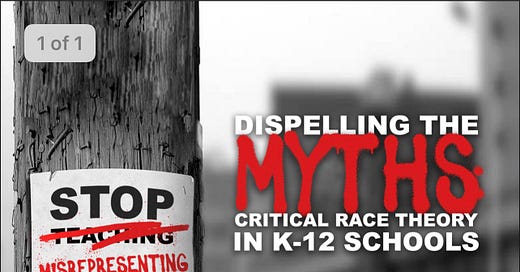In this image, you see one of the many critical race events I have observed at ASU. In this one, critical race theory was being promoted for K-12 education. At that time in our country, parents had been seeing more of what was happening in their children’s classrooms due to Covid distance learning. Parents were objecting to how critical race theory had shaped subjects like American history. Why was an event at ASU promoting this partisan view that a large percentage of Arizona parents did not want taught as objective truth in their public schools?
If you visit EdWeek (a source favorable to CRT), you will find these types of definitions:
“Critical race theory examines how historical discrimination in the U.S. lives on through race-blind legal and social policies regardless of whether the intention of said policies is to fuel racism”
Well, that seems fine right? Studying what might have been unintended consequences of race-blind legal policies. But then you also find this:
“the current debate [about CRT in public schools] appears to spring not from the academic texts, but from fear among critics that students—especially white students—will be exposed to supposedly damaging or self-demoralizing ideas.” [bold is mine]
There we find the standard “phobia” language. Rather than addressing whether or not the assumptions about race and oppression behind CRT are true, its opponents are dismissed as having a mental illness. Another example:
“It’s because they’re nervous about broad social things, but they’re talking in the language of school and school curriculum,” said one historian of education. “That’s the vocabulary, but the actual grammar is anxiety about shifting social power relations.”
So we see that CRT really is about power relations, and if you do not agree with CRT it is because you have a phobia and are scared of new ideas, not because it is demonstrably false. Power, not truth, is their focus. At least they can admit to being relativists who are opposed to the following:
“All these different ideas grow out of longstanding, tenacious intellectual debates. Critical race theory emerged out of postmodernist thought, which tends to be skeptical of the idea of universal values, objective knowledge, individual merit, Enlightenment rationalism, and liberalism”
No more universal values, objective knowledge, or individual merit! Enough said. 😂




